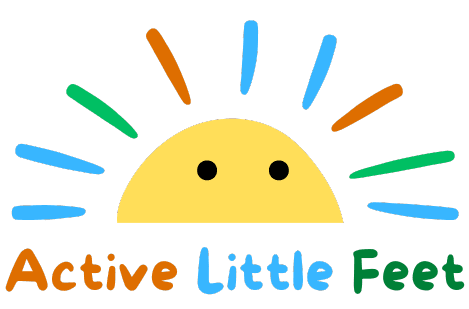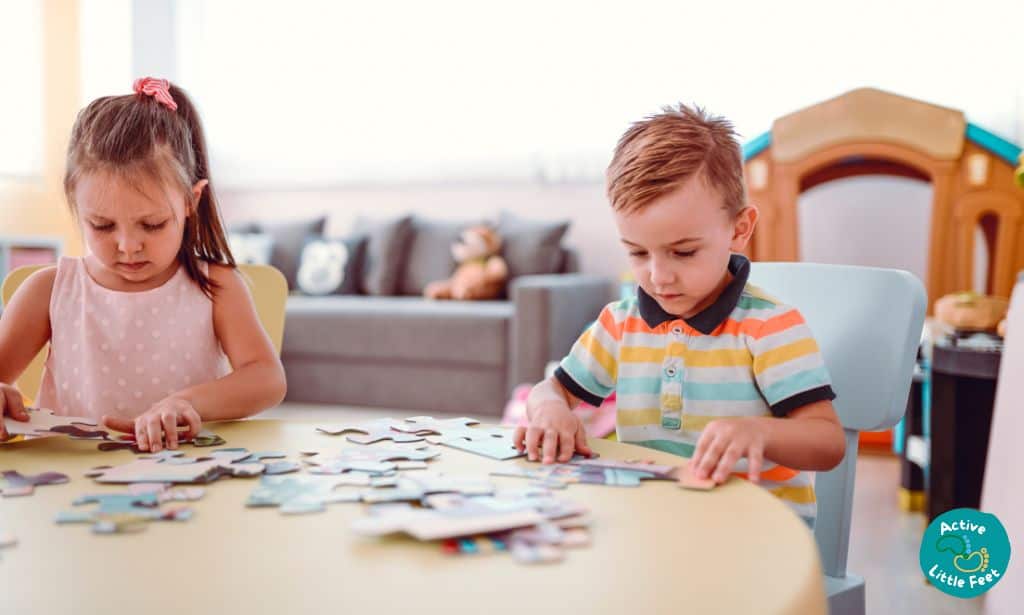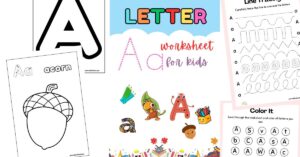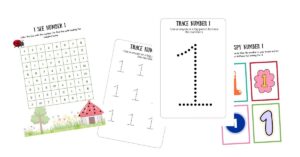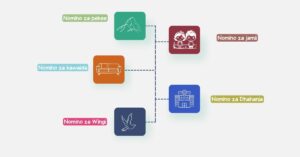A study by MD-SOAR states that focus activities directly impact a child’s academic achievement, and I agree. Over the years, focus activities like puzzle games, art projects, board games, and musical activities have helped me develop the girls’ cognitive abilities.
What’s more, focus activities play an integral role in ensuring kids with ADHD improve their processing speed, impulse control, and memory. Today’s article will delve into several result-oriented activities and highlight all the benefits of focus activities for kids.
But first:
What Is a Focus Activity?
A focus activity is any task that allows the kids to develop and enhance their concentration skills. These activities teach kids to optimize their attention span and concentrate on one task at a time. In addition, a focus activity is any task that encourages kids to follow instructions carefully in a fun and engaging way. These activities usually involve listening and several trial attempts.
5 Focus Activities for Kids
Focus activities target a child’s concentration, so it’s important to maintain variety. You need to incorporate more than one activity to break the monotony and keep them engaged for an extended period. Here are 5 of my favorite focus activities for kids.
1. Memory Games
Memory games are perfect because they challenge a child’s ability to recall and retain information. In addition, these games stimulate various cognitive functions like thinking, problem-solving skills, and information analysis. Most memory games involve recognizing and matching patterns, such as pairs of objects or sequences.
Regular practice with pattern recognition can enhance a child’s ability to identify similarities, differences, and relationships between objects or concepts. What’s more, the games improve verbal communication and foster social interactions that boost your child’s self-confidence.
Here are simple activities that focus on your child’s cognitive abilities:
- Matching Pairs: Create a deck of cards or cut out paper squares and draw matching pairs of objects, shapes, or numbers on them. Shuffle the cards and lay them face down. Kids take turns flipping two cards simultaneously, trying to find matching pairs. The goal is to remember the position of the cards to make successful matches.
- Memory Tray: Place a collection of small objects on a tray, such as a spoon, pencil, toy car, and coin. Cover the tray with a cloth or towel. Show the tray to the kids for a limited time, around 30 seconds, and then ask them to recall as many objects as possible. They can write down or verbally share their answers.
- Sequence Challenge: Create a sequence of actions or items and have the kids repeat it. For example, start with a simple sequence like clapping hands, stomping feet, and then touching their nose. Each child must repeat the sequence correctly, and you can add more elements as the game progresses.
- Number Grid: Create a grid of numbers on paper or a whiteboard. Show the grid to the kids briefly and then erase a few numbers. Kids must recall the missing numbers and fill in the gaps.
- Simon Says: Play the classic game of Simon Says, but add a memory twist. Give instructions in a sequence, and kids must remember and follow the correct order. For example, “Simon says touch your head, then your toes, then clap your hands.”
- Picture Recall: Show a picture to the kids for a limited time and then remove it from view. Ask them to describe or draw what they remember from the picture, testing their ability to recall details.
2. Puzzle Games
Puzzle games as focus activities enhance cognitive abilities, creativity, and problem-solving skills. Young kids have the opportunity to think outside the box and develop the patience to complete various class activities in school.
In fact, according to Goodnet.org, puzzles can boost a person’s IQ by 4 points. Kids become creative and present great ideas at home and in school. Below are the best puzzle games for kids of all ages. Also, you should read this article to discover the ideal puzzle pieces for different ages.
- Jigsaw Puzzles: Conventional puzzles foster spatial awareness, analytical thinking, and focus. As your child develops, start with easier puzzles and progressively add more pieces.
- Sudoku: Sudoku is a logic- and concentration-intensive number puzzle game. It enhances attention while assisting children in developing critical thinking and problem-solving abilities.
- Tangrams: Seven geometric forms make up a tangram, which may be assembled to create a variety of figures. They improve creativity, visual awareness, and spatial thinking. You can play Tangram puzzles with real sets or digitally through apps or online games.
- Crossword Puzzles: Crossword puzzles are great for honing your spelling, vocabulary, and analytical thinking. They assist a child broaden their knowledge across various disciplines and need concentration and attention to hints.
- Rubik’s Cube: A challenging puzzle that improves spatial awareness and problem-solving abilities is the Rubik’s Cube. It is a fantastic brain teaser for children since it calls for focus and perseverance to solve.
- Word Searches: Finding hidden words in a grid of letters is the goal of word searches. These searches can enhance vocabulary, pattern recognition, and visual scanning abilities. There are several different topics and levels of difficulty for word search puzzles.
- Mazes: To navigate a maze from one point to another, one must focus and use critical thinking. They support the growth of attention, patience, and problem-solving abilities.
- Spot the Difference: Identifying differences between two similar photographs is the goal of the game “Spot the difference.” They improve concentration, focus, and visual discriminating abilities.
- Puzzle Apps and Online Games: Online games and puzzle applications are widely available for children and can help them focus and develop their cognitive abilities. Flow Free, Monument Valley, Cut the Rope, and Brain Dots are a few of the well-known ones.
3. Board Games
Board games are the perfect activity for kids with concentration difficulties because they involve strategy, critical thinking, and decision-making. Moreover, these games improve cognitive skills and nurture a child’s attention span. My favorite board game is Scrabble, but you can also play chess, monopoly junior, and Clue. Here is a list of fun board games for young and older kids;
- Scrabble: This game teaches young players the alphabet, spelling, and word construction. It has a streamlined scoring system and is geared toward younger children. You can introduce scrabble junior to young kids because it is easier than the classic Scrabble game.
- Chess: Chess is a fantastic game for fostering critical thinking, strategy, and focus. Children can begin with streamlined versions that teach them the fundamental techniques and principles, such as Chess Junior.
- Monopoly Junior: Designed for younger players, this version of the board game teaches basic math concepts, money management, and decision-making.
- Guess Who?: Guess Who? is a game that teaches children to use yes-or-no questions to find a hidden figure. It improves communication, problem-solving, and logical thinking abilities.
- Catan Junior: This version of the well-known Settlers of Catan game makes the gameplay easier for smaller kids. It introduces ideas like resource management, strategy, and trade.
- Ticket to Ride: Building rail routes over a map is a problem in the strategy game Ticket to Ride for youngsters. It fosters the development of spatial awareness, planning, and critical thinking.
- Sequence for Kids: Sequence for Kids combines the difficulty of matching cards with a well-known board game. It aids in the strategic thinking and pattern identification development of kids.
- Clue Junior: Clue is a great game for kids and a younger version of the classic game. Players solve mysteries by removing suspects, places, and weapons and sharpening their deductive reasoning and critical thinking skills.
- Operation: In this age-old dexterity game, youngsters must treat a patient’s many diseases without touching the corners. It enhances hand-eye coordination and fine motor abilities.
- The Game of Life Junior: This is an added bonus and a fun way to teach your kids the significance of using accurate information in different scenarios. Kids learn about making decisions, handling money, and other life skills with this traditional Game of Life version.
4. Physical Activities
Indoor and outdoor physical games will eliminate a lack of focus, regardless of the child’s age. It would help if you encouraged the kids to participate in fun focus games like martial arts, yoga, soccer, cycling, and more.
Apart from improving the short attention span, these physical activities also act as an energy outlet, allowing the kids to stay active and healthy. Here are fun suggestions for young and older kids.
- Nature Scavenger Hunt: Create a list of objects for children to locate in nature, such as leaves, rocks, flowers, or specific animal footprints, for a nature scavenger hunt. They must focus on finding and recognizing the objects, honing their observational and focusing abilities. Here’s a list of fun leaf activities for your kids, including sensory bin games.
- Obstacle Course: Using cushions, hula hoops, cones, and other everyday home objects, construct an obstacle course in your lawn or living room. Children can balance on defined areas, leap over barriers, and crawl beneath tables. Focus, coordination, and problem-solving abilities are all enhanced by this practice.
- Skipping Rope: Children should learn how to skip rope, and you should encourage them to try out other moves like double unders and leaping on one foot. Skipping rope enhances balance, coordination, and focus.
- Yoga for Kids: Through engaging and enjoyable lessons, introduce kids to the fundamental positions of yoga. Yoga improves flexibility, body awareness, and focus. Yoga instruction for children may be found online or through specialized applications.
- Relay Races: Hold relay races in your garden or local park. Set up various tasks for the kids, such as sprinting, hopping, or balancing things, and divide the kids into teams. Children must focus on their turn and cooperate as a team.
- Balloon Tennis: Use tape to draw the bounds of a temporary tennis court. Each youngster will receive a paper plate to serve as a racket, and the ball will be a balloon. They must concentrate on sharpening their hand-eye coordination and attention while repeatedly striking the balloon.
- Freeze Dance: Play exciting music and incite children to freeze dance. Randomly halt the music; they must hold their position when it resumes. While having fun, this exercise encourages kids to concentrate on listening.
- Martial Arts: Enroll youngsters in lessons for martial arts like karate or taekwondo. While teaching self-defense skills, these disciplines emphasize attention, discipline, and self-control.
- Breathing and Stretching Exercises: Instruct kids on breathing exercises and deep stretches. They can unwind, concentrate, and better understand their bodies through these exercises.
5. Video Games
Believe it or not, video games are a big help to your child’s poor attention span. Research by the National Institutes of Health states that children who played video games for at least three hours daily showed higher brain activity in the regions associated with memory and attention. Therefore, when your kids are not engaging in outdoor physical activities, find fun videos to keep them entertained for a few hours.
However, be wary of excessive screen time as that can affect their performance in other daily activities. It is best to provide consistent brain breaks by setting a time limit for each game session. The frequent breaks allow the brain to relax, and the kids can participate in different sports activities before continuing with the video games.
Overall, many focus activities for kids will improve their attention skills while providing fun alternatives. You can set routines and curate simple activities that nurture your child’s nervous system, especially in early childhood. If you’re interested in other great ideas, this article highlights the best hiking games for parents and their kids.
